Our view at Stack - Shopify has just about everything you need if you're looking to sell online. It excels with unlimited products, user-friendly setup, and 24/7 support. It offers 6,000+ app integrations, abandoned cart recovery, and shipping discounts up to 88%. Plus, it allows selling both online and in-person, scaling as your business grows.
Building a new website can be both exciting and challenging. Whether it’s designing the perfect layout or creating engaging content, there’s lots to do. It’s also important to ensure a secure and reliable browsing experience, with easy navigation and safe ecommerce features.
The good news is that a variety of affordable, accessible website builders are available—many designed for specific needs. Whether you want to sell products, publish writing, promote a business, or showcase your portfolio, there’s a web builder to help you achieve your goals.
9 best website builders
- Shopify: Best for ecommerce websites
- WordPress: Best for blog websites
- Wix: Best for portfolios
- Squarespace: Best for business websites
- GoDaddy: Best for simple websites
- Duda: Best for website agencies
- Webflow: Best for website developers
- Weebly: Best for quick, free websites
- Big Cartel: Best for artists
1. Shopify
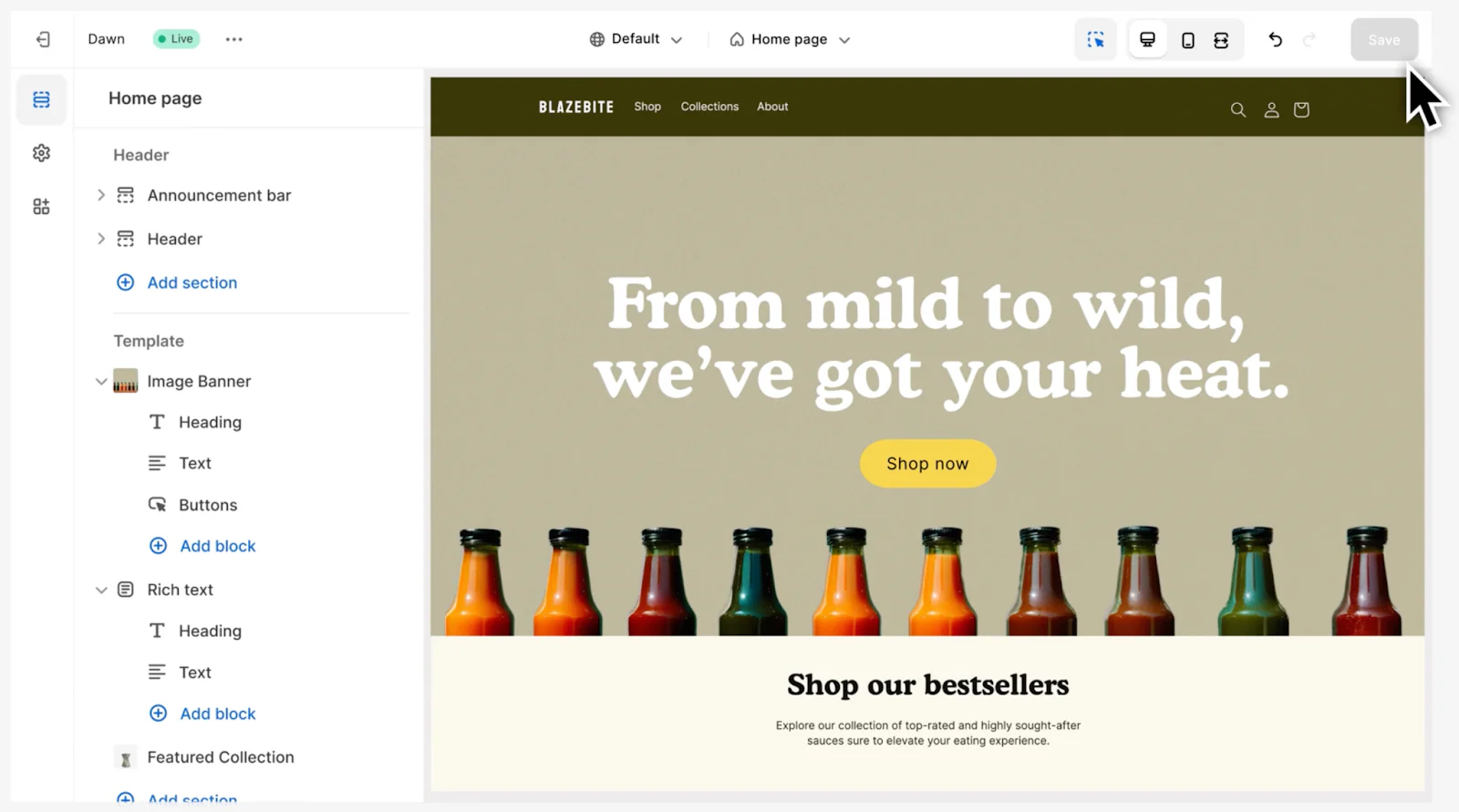
Best for
eCommerce websites.
Shopify is the best website builder for creating an online store and managing an ecommerce business.
Why?
Use Shopify to create a beautiful, functional ecommerce website with pre-built templates or custom code. Each website comes with hosting, a free subdomain, SSL encryption, and selling tools. Create product listings and sell through the world’s best-converting checkout that lets customers buy with one click. Connect your website to sales channels like Instagram, TikTok, and Google, or talk to customers directly via the built-in email tool.
Plans and pricing
Full plans start at $29 per month for Shopify Basic, which includes access to the website builder. Try it out with a free trial.
Features
Pros and cons
- It’s easy to start a website using a free myshopify.com subdomain, then upgrade to a custom domain when you’re ready.
- Enjoy unlimited product listings and website bandwidth.
- Learn about your site traffic with simple reporting and analytics tools.
- Shopify has fewer non-ecommerce features than other website builders.
2. WordPress

Best for
Blog websites.
WordPress is a website builder for writers to publish blogs, newsletters, and other text-focused websites.
Why?
Much of WordPress’s power as a website builder comes from the level of creative control it gives users. Those looking for a guided experience with built-in features can start a hosted site on wordpress.com. If you’re tech-savvy, you can download WordPress as open-source software to create a flexible self-hosted website.
Plans and pricing
WordPress’s free plan includes 1 GB of storage space and dozens of website templates with drag-and-drop layouts. Upgrade to a paid plan to access extra features and plugins.
Features
- Create a free, hosted wordpress.com subdomain.
- Use WordPress as web-building software for your self-hosted website.
- Add a Buy Button to your WordPress website to sell products.
- Browse more than 50,000 plug-ins, including shipping, marketing, and SEO tools.
Pros and cons
- WordPress is a popular and trusted platform for bloggers and other types of writers.
- Start a basic website quickly, then add features as you grow.
- Costs and complexity can quickly increase as you add third-party plug-ins.
3. Wix
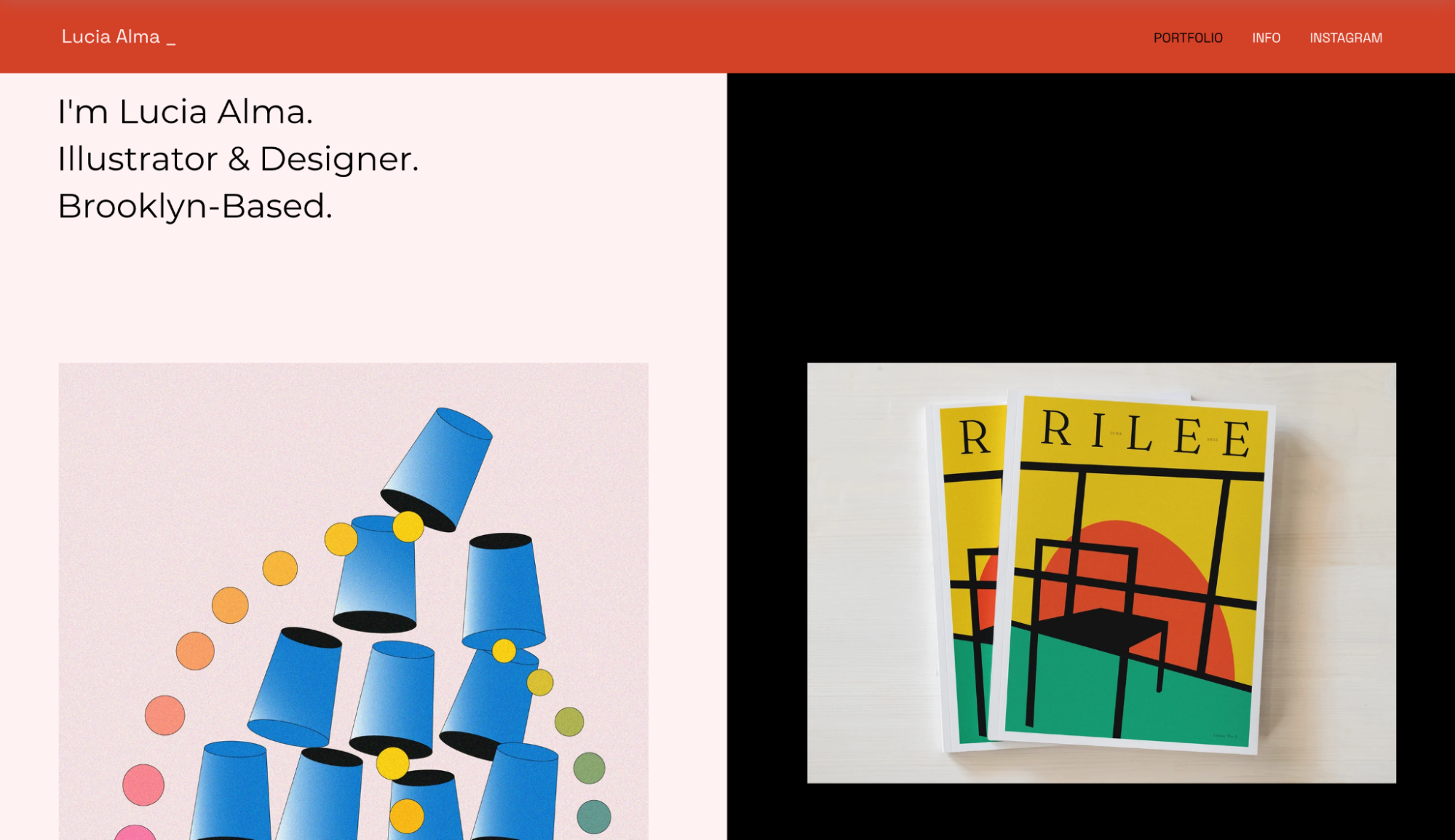
Best for
Portfolios.
Wix is a website builder for personal and business websites, including professional portfolios to showcase your work.
Why?
Create a portfolio containing images, videos, text, and data using Wix’s simple drag-and-drop website builder. The platform has more than 75 pre-made portfolio and CV website templates, making it easy to find a foundation for your site, then customize it with your branding and content.
Plans and pricing
Wix’s free plan includes a website builder and a wixsite.com subdomain. Upgrade to a paid plan to remove Wix branding, add a custom domain, and access ecommerce features.
Features
- A simple and intuitive website builder.
- Free plans come with 500 MB storage and 1 GB bandwidth.
- Choose from various price plans to suit different website uses.
Pros and cons
- Browse a large library of website templates.
- Access to most features requires upgrading your plan.
- Other website builders such as Squarespace and Webflow may be better suited to creative portfolios.
4. Squarespace

Best for
Business websites.
Squarespace is a multipurpose website builder for personal, business, and ecommerce websites.
Why?
Businesses can choose from Squarespace’s library of more than 100 website templates to promote their services and brands. All templates are customizable via the Squarespace editor—and if you have the skills, you can also dive into the code. Put your twist on themes designed for restaurants, agencies, online courses, and other types of businesses. Add additional features such as an online store checkout or appointment booking app.
Plans and pricing
Build a website using the Personal plan for $16 per month. Upgrade to access website analytics and additional features.
Features
- Create responsive websites with image scaling.
- Get a free custom domain for the first year.
- Upgrade to convert your website to an online store and accept payments through Stripe and PayPal.
Pros and cons
- Stylish and contemporary website templates.
- Access a range of features with the Personal plan.
- Limited support for ecommerce and multichannel sales.
5. GoDaddy
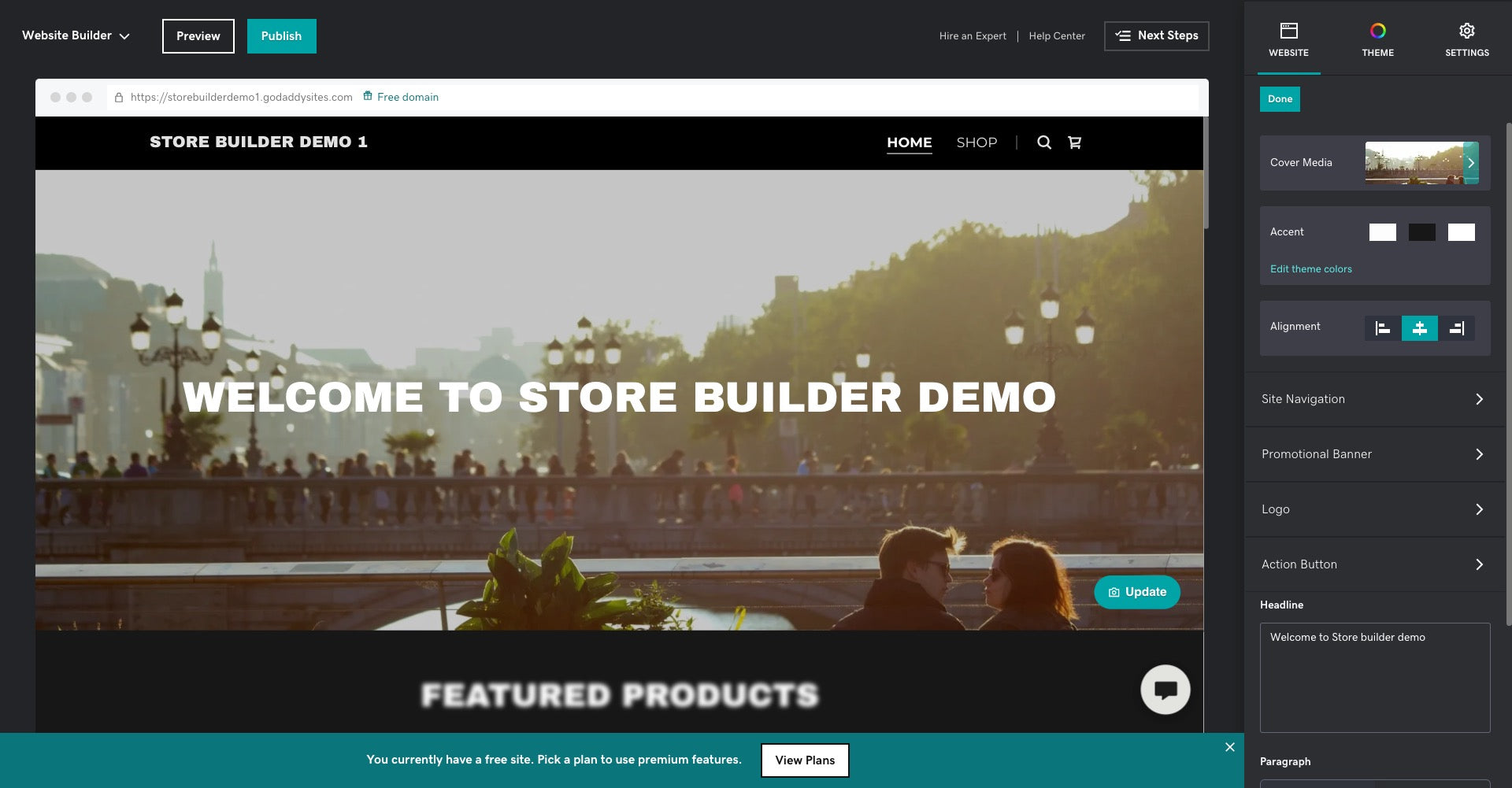
Best for
Simple websites.
GoDaddy is a basic website builder for creating simple personal and professional sites.
Why?
GoDaddy’s drag-and-drop builder uses artificial intelligence to create a website in minutes, based on the information you provide. However, some may find GoDaddy website templates basic. Customization options can be limited, and if you want to run an online store, you’ll need to use the separate, more expensive store builder.
Plans and pricing
GoDaddy’s Basic plan includes access to the website builder for $10.99 per month.
Features
- Browse more than 100 mobile-friendly templates.
- Connect a custom domain to Basic plan websites.
- Use the store builder to integrate Square POS for physical sales.
Pros and cons
- Easy website editing for beginners without coding experience.
- Limited features and customization options.
6. Duda

Best for
Website agencies.
Duda is a website builder designed to help agencies offer web design services to multiple clients.
Why?
For website development businesses, Duda offers a white-label website builder. This allows agencies to offer clients a branded website builder on a custom domain as part of their services. Clients can log into the platform from a custom-branded login screen. Duda’s website builder comes with all the standard tools and features for creating responsive websites, with the freedom to place elements anywhere on the page.
Plans and pricing
Plans start at $19 per month. Most white label features require the White Label plan for $149 per month.
Features
- Unlimited website storage and bandwidth.
- Hosting via Amazon Cloud.
- Access a large library of stock images.
Pros and cons
- Expand your business’s services with a branded version of the website builder.
- Other website builders may be better suited to individuals and small businesses.
7. Webflow
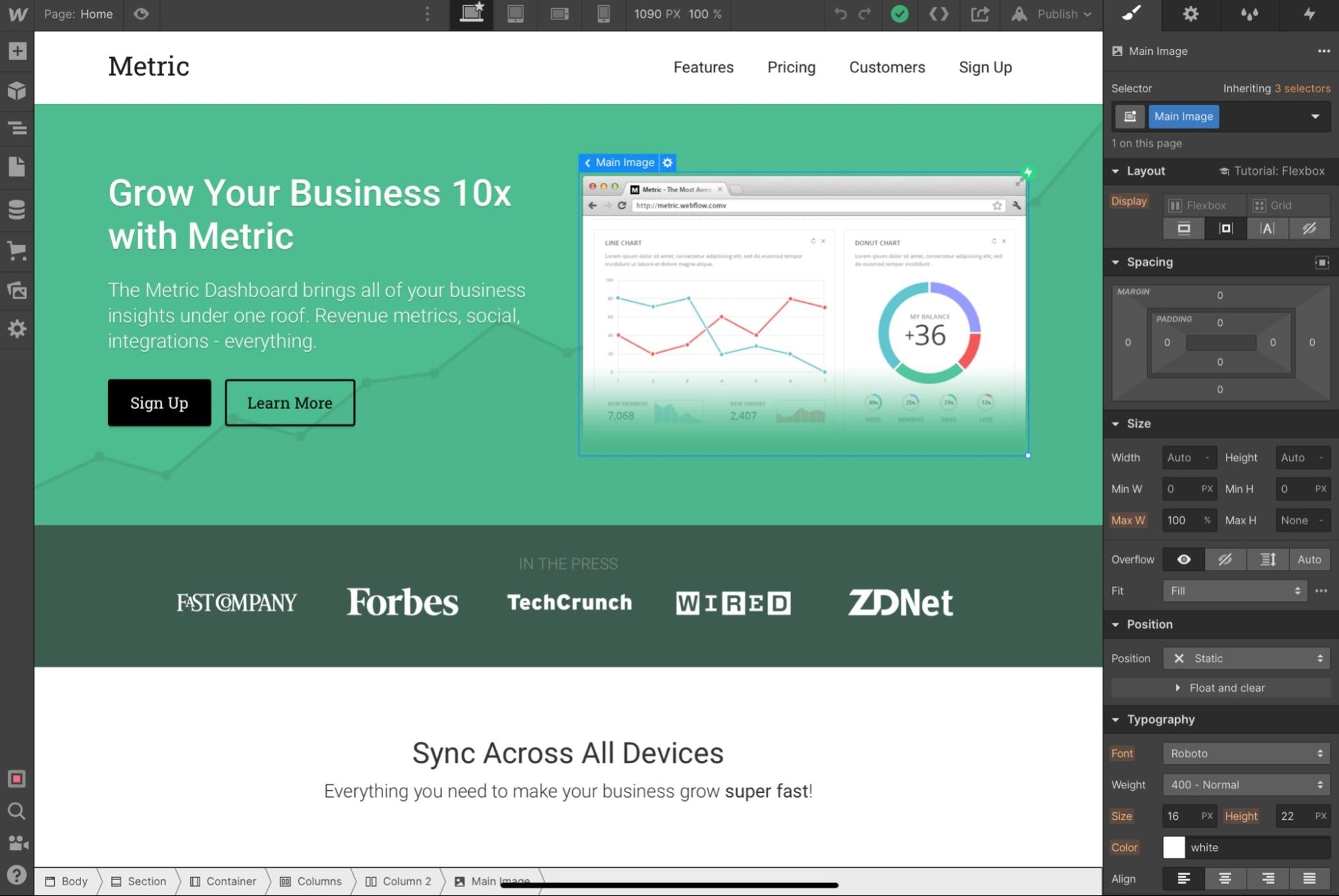
Best for
Developers.
Webflow is a website builder for advanced website developers.
Why?
Webflow is a powerful DIY website builder with professional-grade customization options. Often cited as a superior WordPress alternative, Webflow offers complex functionality to developers and designers who want to create without limitations.
Plans and pricing
Create a two-page site with a webflow.io subdomain for free. Full website design plans start at $14 per month.
Features
- Website hosting is included.
- Build advanced website interactions, page transitions, and animations.
- Workspace features for collaborating with team members.
Pros and cons
- Less focus on templates and tools can be a pro or con, depending on user need.
- Many find Webflow has a steeper learning curve than other website builders.
8. Weebly
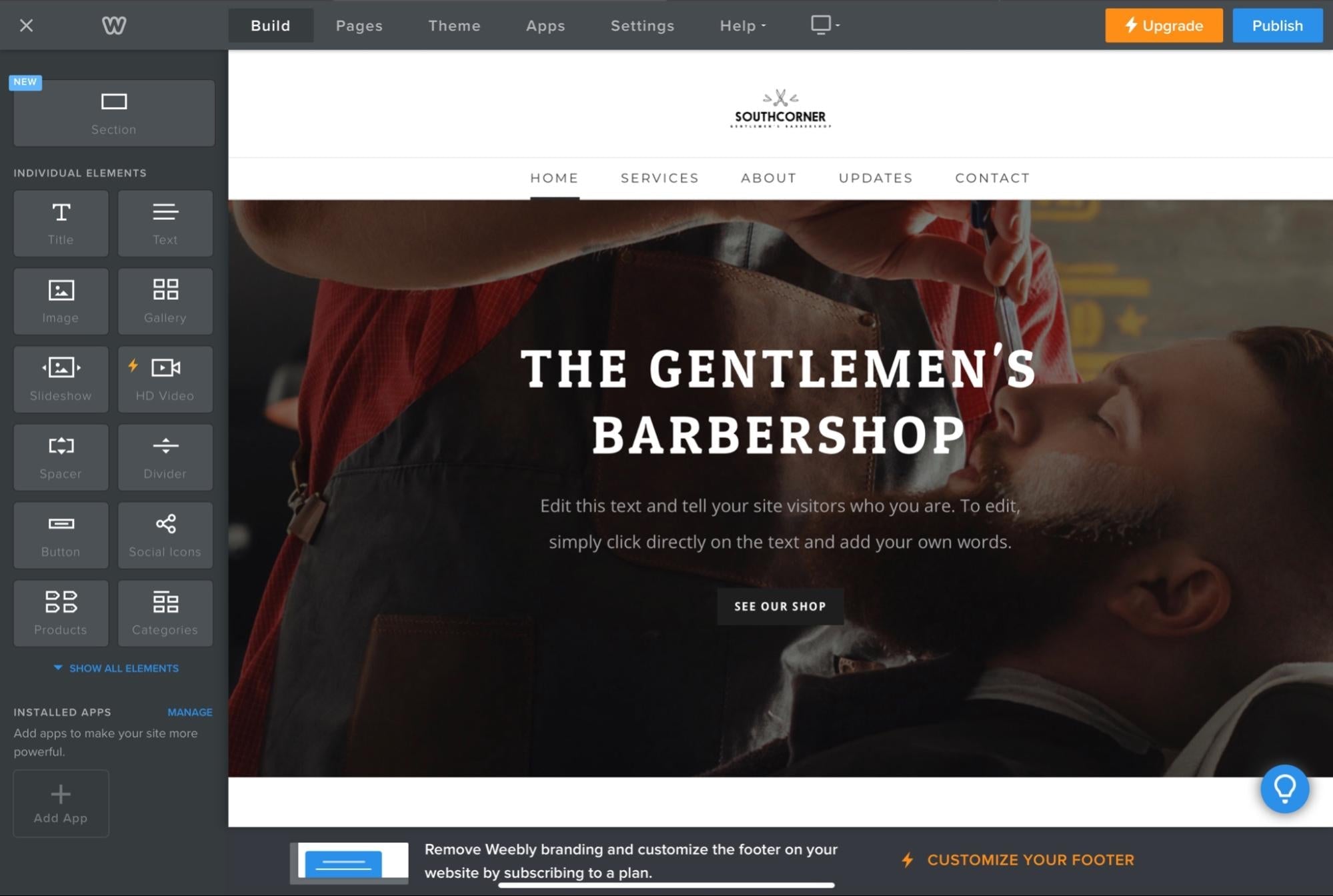
Best for
Creating quick, free websites.
Weebly is a website builder for creating a quick, free personal website or online store.
Why?
Now part of Square’s suite of business tools, Weebly is a site builder with a free plan that comes with a range of tools. Free features include a shopping cart, Instagram feed, and free subdomain to host your site. In return, Weebly will add its branding to your website, which can be removed by upgrading to a paid plan.
Plans and pricing
It’s free to access most of Weebly’s website builder features. Paid plans start at $10 per month, allowing you to connect a custom domain and access extra features.
Features
- Free hosting and weebly.com subdomain.
- Add animation to your site with parallax effects and video backgrounds.
- Customize all HTML and CSS code.
Pros and cons
- Many features are available on the Free plan.
- Paid plans offer fewer features than other website builders.
9. Big Cartel

Best for
Artist websites.
Big Cartel is a website builder for makers to display and sell art, crafts, and other creative work.
Why?
Big Cartel was founded by artists to help creators sell work independently, without needing to rely on galleries or marketplaces. Websites are easy to set up, with basic features available for free, making the platform a worthy alternative to Etsy.
Plans and pricing
The free Gold plan includes website templates and limited selling features.
Features
- Designed for artists and creatives.
- Sell up to five products using the free website builder plan.
- Includes website hosting.
Pros and cons
- Product listings can only contain five images.
- Few payment gateways are supported.
How does a website builder work?

Website builders are designed to remove the technical barriers that used to be part of website development. Today’s online platforms make it easy for anyone to create and run a website, even if you don’t know how to code.
Online site builder platforms provide user-friendly interfaces to guide you through website setup, layout design, content creation, publishing, and site management.
Most website builders are designed to function in a similar way. Here’s how they work:
Set up hosting and domain services
One of the first things you’ll encounter with website builders is the option to choose a domain and set up hosting. A domain name is your site’s unique address on the internet, while hosting is where your site data is stored so it can be accessed at any time.
Many website builders offer hosting and a free subdomain that allows you to create a website without purchasing a custom domain. Subdomains usually include the platform’s name, like yoursitename.myshopify.com.
When you’re ready to grow your brand, you can register a new domain through your website builder. As your website’s needs become more complex, you may also decide to self-host your site.
Pick a template
After securing your domain and hosting, most website builders will encourage you to select a template for your website. Templates are pre-designed site layouts tailored to various website uses, such as businesses, blogs, or ecommerce stores.
Depending on the flexibility of the website builder, you’ll be able to customize your chosen template. This might mean altering elements like fonts, colors, and images using a drag-and-drop interface. If you’re experienced with tech, some platforms allow you to edit the template’s code to create a completely original website design.
Add features
Once you’ve built a basic site, you can add features to meet your visitor’s needs. If you made your website to sell products, include a shopping cart and secure checkout. If you’re setting up a blog, add an archive, search bar, or social media feed.
Most website builders specialize in features for a particular type of website, so it’s important to find the right fit. For example, Shopify’s website builder comes with everything you need to create an online store and run a retail business.
Publish and manage your site
Once you’re satisfied with your site’s appearance and functionality, go live by hitting the Publish button. This makes your site accessible to anyone on the internet.
Depending on your website builder and subscription plan, you’ll be able to track visitors and manage your site using automated reports and analytics dashboards.
What to look for in a website builder
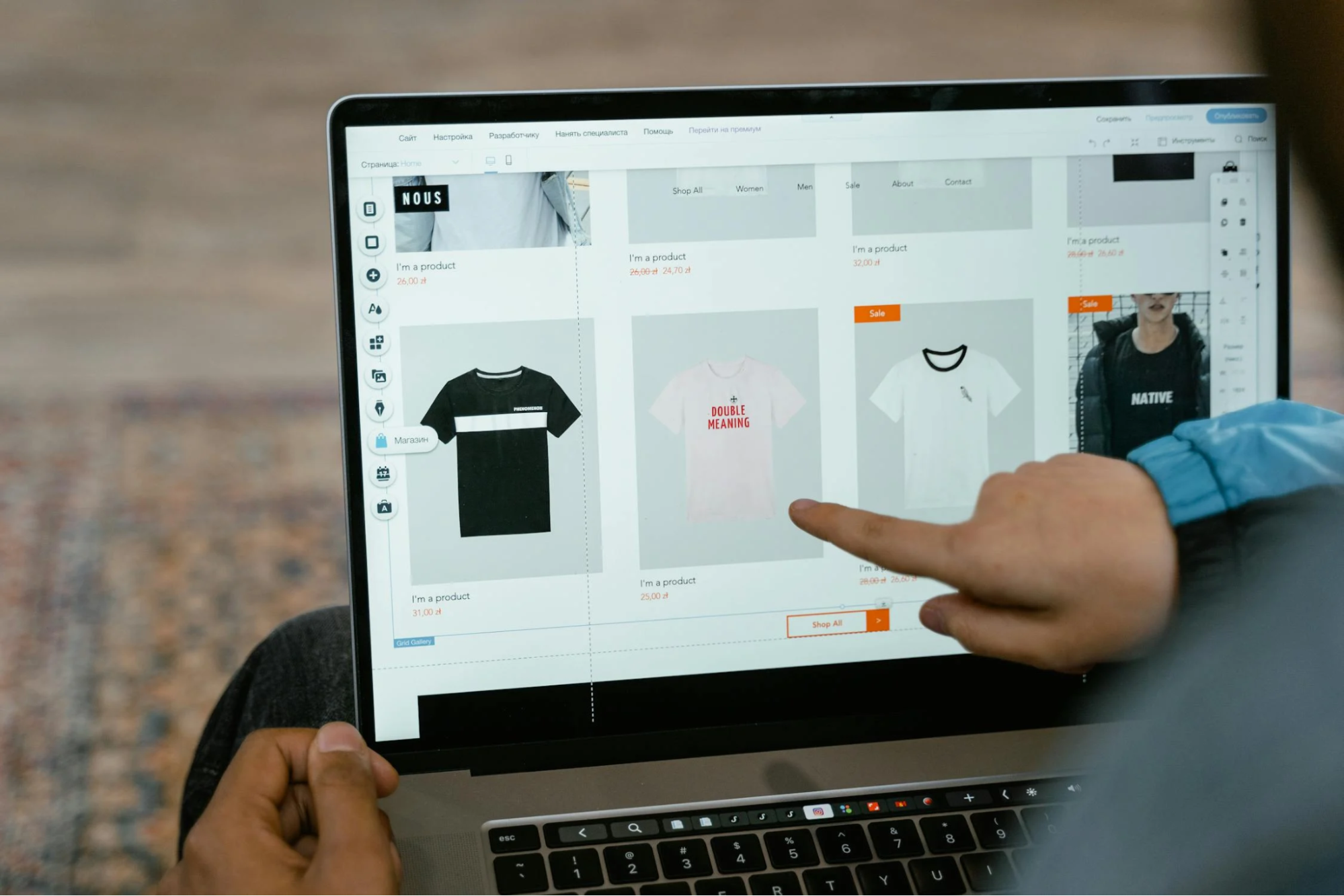
Choosing the right website builder can be as crucial as selecting your business location. Each platform offers unique features, benefits, and limitations.
Consider these elements to find a website builder that will scale with your needs and won’t hinder your site’s potential.
Price plans
Balancing website costs and functionality is essential for managing your initial business finances. While free website builders are enticing, they often come with limitations like platform ads or restricted features.
On the other hand, paid platforms offer valuable extras such as web hosting and professionally designed templates, which can be more cost-effective in the long run.
A good compromise is to look for website builders with tiered subscription plans, so you can begin with a basic website and expand its features in the future.
Ease of use
Whether you’re a coding expert or prefer a drag-and-drop editor, platform usability is a critical factor. The ideal website builder should help you refine your site’s design effortlessly, not just in the initial stages, but as your site grows and your skills improve.
Features
Website builders vary in the features they offer. It’s vital to assess the features available in each subscription plan and think about how these align with both your current needs and future ambitions.
Ecommerce website builders should provide tools to help your store grow, such as POS hardware, social media sales integration, and access to funding.
Level of customization
While most website builders offer some level of customization, many are limited in the creative flexibility they offer. This can pose a challenge for businesses looking to build a distinctive brand.
Review how flexible each platform is with design choices and how much creative freedom you’ll have to ensure your website stands out.
Methodology: How the best website builders were chosen
To pick the top website builders for 2024, this review started with a broad survey of the market before narrowing down to these nine platforms. Each platform was evaluated based on popular qualities, including ease of use, customization options, specialized features (such as ecommerce tools and portfolio templates), and pricing plans.
Preference was given to website builders that grow with businesses, providing both low-cost, entry-level options and support for advanced website development. Shortlisted website builders were selected after hands-on testing, advice from industry experts, and analysis of user feedback.
Find a home for your website
Choosing a home for your website is a lot like finding the right place to live. You need somewhere that’s easy to make your own, simple to maintain, and capable of accommodating changes down the line.
If your goal is to build a simple landing page displaying contact information or business hours, a free website builder should meet your needs. But, for those dreaming of a bustling online store or a dynamic space to interact with visitors, starting with a scalable website builder is key to avoiding the hassle of moving later on.
Build your online store today.
Best website builder FAQ
How much does it cost to build a website?
The cost to build a website varies depending on your needs. If you’re starting with something simple, like a basic landing page, you may use a free website builder. For more complex websites, especially those with ecommerce features or extensive customization, prices start at around $10 per month for basic plans, and increase depending on the tools included.
What are the best website builders for small businesses?
Shopify’s website builder easily adapts to different sizes and types of businesses. Its user-friendly interface, combined with powerful tools for online sales and marketing, makes Shopify an ideal choice for entrepreneurs who need a reliable online presence. Other website builders for small businesses include Wix, Squarespace, and GoDaddy.
What is the best website builder for ecommerce?
Shopify is the best website builder for ecommerce because it offers a comprehensive solution that suits businesses of any size. It combines ease of use with powerful sales tools, including payment gateway integrations, inventory management, and shipping options, making it ideal for those looking to build an online store.
Which free website builder is best?
Weebly is the best choice for a free website builder. It provides robust features even on its free plan, including responsive templates, SEO tools, and ecommerce capabilities. It’s a great starting point for beginners and those not ready to invest in a paid plan.
Related article
11 Best Ecommerce Platforms for Your Business in 2024

This comprehensive guide to the 11 best ecommerce platforms will help you make the most informed choice for your business.
If Shopify is of interest and you'd like more information, please do make contact or take a look in more detail here.
Credit: Original article published here.
